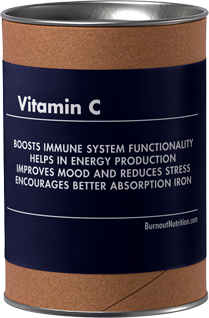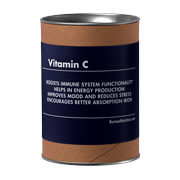Chronic Fatigue Syndrome (CFS) is a long-term illness with a multitude of symptoms, the most common one being extreme tiredness. Vitamin C, also known as ascorbic acid, can potentially aid people suffering from this syndrome in a few ways:
Boosting Immune System
Vitamin C contributes to maintaining the immune system’s functionality. By enhancing immune function, it can help to protect the body from various illnesses that can exacerbate the symptoms of CFS.
Antioxidant Role
As an antioxidant, Vitamin C helps to reduce the inflammation in the body. Chronic inflammation can lead to fatigue, hence reducing the inflammation may lessen the fatigue symptoms associated with CFS.
Energy Production
Vitamin C plays a crucial role in the production of energy in our bodies. It aids the body in the absorption of iron, an essential element for the production of energy. Consequently, an increase in energy levels can help in managing the symptoms of CFS.
Stress Reduction
People suffering from CFS often face stress and mental fatigue. Vitamin C has been recognized for its potential to reduce stress levels, and as a result, it might alleviate some mental fatigue symptoms.

- Boosts immune system functionality
- Helps in energy production
- Improves mood and reduces stress
- Encourages better absorption of iron
- Promotes healthy adrenal gland function
Vitamin C: Purchase | Dosage | Benefits | Science
Buy Vitamin C online:
Important Note: This information serves as a guideline only and should NOT replace specialist advice. Always consult your doctor, pharmacist or a health care professional like a nutritionist before starting any new treatment.
Vitamin C Dosage for Chronic Fatigue
- For adults (18 years and above), the recommended dosage of Vitamin C is approximately 1000 mg per day irrespective of gender.
- For children and teenagers (up to 17 years), a maximum of 500 mg per day is recommended.
- For pregnant or breastfeeding women, it can be increased to a maximum of 2000 mg per day.
Please note that these dosages are general guidelines; individual dosages may vary and should be directed by a medical professional. People with certain conditions like kidney stones or anemia should seek medical advice before taking high-dose supplements. Excessive Vitamin C can lead to diarrhea, nausea, and stomach cramps.
Vitamin C Benefits for Chronic Fatigue
- Boosts the immune system.
- Increases energy production.
- Reduces inflammation.
- Fights off free radicals.
- Supports adrenal gland functioning.
- Boosts Immune System: Vitamin C enhances the body’s immunity by supporting various cellular functions involved in both innate and adaptive immunity and can help to fight the underlying infections that might be causing chronic fatigue syndrome.
- Reduces Oxidative Stress: It acts as an antioxidant, protecting cells from harmful free radicals. This can help to reduce inflammation and oxidative stress often associated with fatigue disorders.
- Improves Energy Levels: Vitamin C plays a key role in the production of L-carnitine, which helps the body convert fat into energy. This can help address the low energy levels experienced in chronic fatigue syndrome.
- Supports Adrenal Function: The adrenal glands, which are central to the body’s response to stress, have a high requirement for Vitamin C. Supporting adrenal function might help mitigate some symptoms associated with chronic fatigue syndrome.
- Improve Mood and Cognitive Function: It may have a mood-elevating effect and also aids in the production of neurotransmitters like norepinephrine which are essential for brain function and mood regulation, helping to alleviate some of the cognitive and mood-related symptoms of the condition.
Vitamin C & CFS/ME/Burnout – The Science
Chronic fatigue syndrome (CFS): Suggestions for a nutritional treatment in the therapeutic approach
| ⏍
This review focuses on nutritional intervention in CFS, discussing various immunological, environmental, and nutritional aspects investigated in relation to the disease. It highlights the significance of certain nutrient deficiencies, including Vitamin C, in the severity and exacerbation of CFS symptoms.
The value of the dehydroepiandrosterone-annexed vitamin C infusion treatment in the clinical control of chronic fatigue syndrome (CFS). II. Characterization of CFS patients with special reference to their response to a new vitamin C infusion treatment
| ⏍
This study investigates the effectiveness of a new vitamin C infusion treatment for chronic fatigue syndrome, emphasizing its value in the clinical control of the condition and characterizing CFS patients’ response to the treatment.
Vitamin and mineral status in chronic fatigue syndrome and fibromyalgia syndrome: A systematic review and meta-analysis
| ⏍
This systematic review and meta-analysis investigate the status of vitamins and minerals in chronic fatigue syndrome and fibromyalgia syndrome patients. It examines the relationship between nutrient levels and these syndromes, highlighting the role of Vitamin C among other nutrients.
Natural sources of Vitamin C
Good natural sources of Vitamin C include:
- Oranges
- Kiwis
- Strawberries
- Guavas
- Papayas
- Pineapples
- Mangoes
- Watermelons
- Cantaloupe
- Blueberries
- Raspberries
- Cranberries
- Tomatoes
- Peppers
- Brussels sprouts
- Broccoli
- Kale
- Spinach

Our favourite Vitamin C brand
We recommend Solgar brand Vitamin C because it’s:
- Reliably high quality
- Easily available almost everywhere
- Relatively cheap
- Reviews support our opinion
- Vegan
There are also Ester-C, liquid, and other formats of Vitamin C available.





